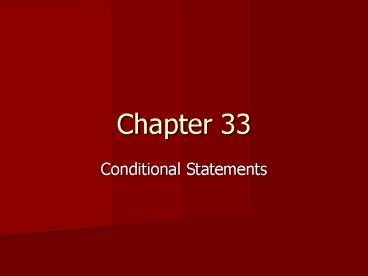Conditional Statements - PowerPoint PPT Presentation
Title:
Conditional Statements
Description:
Chapter 33 Conditional Statements What is a condition? While you may not be accustomed to the term conditional statement, you use them in various forms every day. – PowerPoint PPT presentation
Number of Views:90
Avg rating:3.0/5.0
Title: Conditional Statements
1
Chapter 33
- Conditional Statements
2
What is a condition?
- While you may not be accustomed to the term
conditional statement, you use them in various
forms every day. - An at least two-part statement which indicates
that one state or act is dependent (conditional)
upon the occurrence of another state or action. - If I drink too much, I say stupid things.
3
Structure
- As mentioned before, a conditional statement
requires at least two formal sections - The if section called a protasis.
- The then section called an apodosis.
4
Protasis
- This is formally a subordinate clause.
- It establishes the premises or conditions under
which the action or state of the apodosis occur.
- There may be more than one.
- In English, it is usually introduced with if,
whenever, unless, etc. - In Latin, it is usually introduced with si or
nisi.
5
Apodosis
- This is formally the independent or main clause.
- It establishes what action or state occurs or
hypothetically occurs if the conditions are met. - There may be more than one.
- There are no key terms that indicate this portion
of the sentence as it is the main clause.
6
Types of Conditions
- There are two formal types of conditional
statements in Latin. - General/Specific indicated by the use of the
indicative mood. - Potential indicated by the use of the subjunctive
mood. - Both of these have three major subsets based upon
the tense of the verbs.
7
General/Particular
- These are indicated by the use of the indicative
mood verbs. - Present General/Particular
- If Im here, she is too.
- Past General/Particular
- If I was there, she was too.
- Future General/Particular
- If she will be there, I will be too.
8
Potential
- These are indicated by the use of the subjunctive
mood verbs. - Present Potential Imperfect Subjunctives
- If she were here, I would be happy.
- Past Potential Pluperfect Subjunctives
- If she had been here, I would have been happy.
- Future Potential Present Subjunctives
- If she should be there, I would be happy.
9
Examples
- si pecuniam amas, sapientia cares.
- si veritatem quaesivissemus, scientiam
invenissemus. - multos amicos amitteretis, nisi iram vitaretis.
- laudavimus eum, si quis bonos mores habuit.
- si isti vincant, discedamus.































